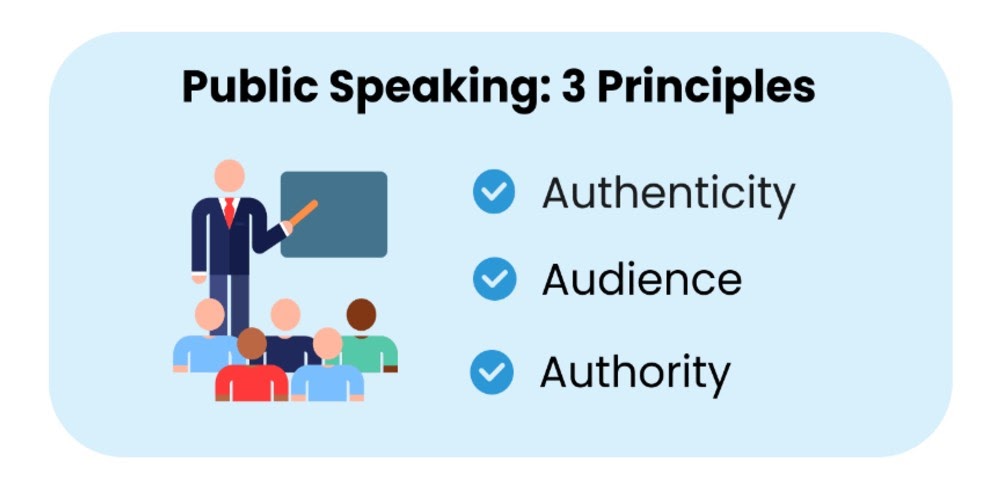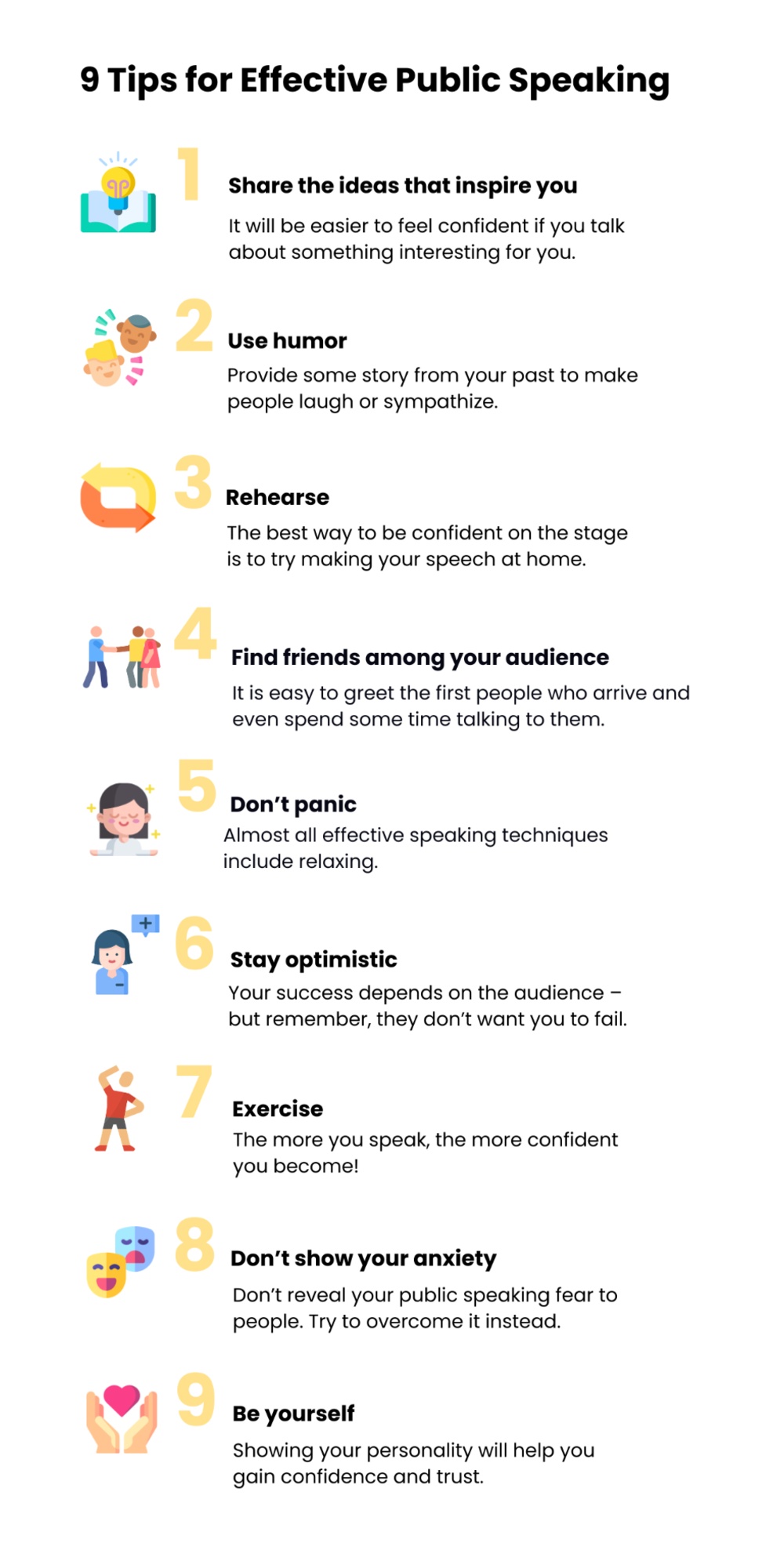Public speaking and video recordings can cause panic for the most level-headed people. For some reason, a crowd of listeners in front of us makes our tongue refuse to move, our throat stops to make sounds, and our brain fails to generate ideas.
Meanwhile, public speaking is much easier than it seems if you know how to be a good speaker. This article unites all the tips for effective public speaking. It also suggests techniques for improving your skills in making presentations. These tips by Custom Writing experts can be used to train at home or even arrange an extracurricular course for high school or college students.

🗝️ Key Principles of Public Speaking
Before facing a crowd, you should remember several things that make almost any speech a good one. Thanks to these principles, your words become more plausible. They can as well facilitate your improvisation and recalling the details to support your opinion.
- Be authentic. Great speeches have never been read from a sheet of paper. They came from the heart of their author. Probably, these words were prepared and thought through many times. But they were pronounced from scratch, as the speaker “felt.” Audiences are masters of spotting lies and invented stories. That is why take your examples from reality.
- Mind your audience. We are afraid to receive disapproval, but the audience is on the speaker’s side in most cases. Everyone knows how challenging public speaking is. Still, this does not presuppose that you can ignore the needs and interests of your listeners. Any complex data requires explanation. If your speech is too long, suggest a five-minute break. And the most important thing, a speaker shall be a masterful marketing expert who “sells” information. Make it exciting and easy to remember.
- Grab the authority. There will always be someone smarter, wealthier, or more experienced than you. But while you are speaking, imagine that you are the one. The stage is yours for the time being. Public speaking is an act of leadership. Do your best to inspire the audience and elevate their spirits.
Why Is Public Speaking Important?
- It makes you comfortable with yourself and with others.
- It can help you get a better salary or job.
- It is the best way to persuade people.
- Everyone has to do this at some point.
- Public speaking skills can be helpful in other spheres.
👌 9 Tips for Effective Public Speaking
Below you’ll find nine useful tips for effective public speaking. Want to become more confident and convincing when making speeches and presentations? Use these tips to boost your skills!

- Share the ideas that inspire you. It’s difficult for a public speaker to feel confident while talking about a topic far from their interests. Find several appropriate arguments to support the issues you’ll talk about, add new appealing ideas, and your fear of speaking will bother you less.
- Use humor. If you make an informal speech, it’s appropriate to use humor to warm up the audience. Or provide some story from your past to make people laugh or sympathize.
- Rehearse. Have you heard that “practice makes perfect”? The best way to be confident on the stage is to be sure you can make a speech. How can you be sure? Try it at home! Record yourself with the help of voice recording apps to find your weak sides and flaws so that you can work on them and improve.
- Find friends among your audience. There are many ways to improve public speaking, and one of them is to speak to familiar people. It isn’t challenging to greet the first people who arrive and even spend some time talking to them. For example, you can ask about your microphone’s loudness or presentation visibility. It’s an essential step in conquering public speaking fear, so try it yourself.
- Don’t panic. Almost all effective speaking techniques include relaxing. The less you let yourself become nervous, the more confident and calm you become. To speak in public easily, use some basic relaxation techniques like counting or breathing slowly. If you still feel anxious, turn this anxiety into the energy for your presentation.
- Stay optimistic. Yes, public speaking success depends on the audience – but remember, they don’t want you to fail. Better speaking skills are easier to achieve when you think positively about the people who listen to you.
- Don’t show your anxiety. Remember – in an auditorium, it’s only you who notices public speaking anxiety. Your listeners can’t understand how you feel most of the time. So, don’t reveal your public speaking fear to them. Try to overcome it instead. If you control it, it’ll disappear.
- Exercise. Remember – no one will overcome your public speaking fear instead of you. You should exercise a lot and gain new experience. The art of public speaking is possible for everyone to master. Moreover, the more you speak, the more confident you become!
- Be yourself. Don’t be a talking head. Showing your personality will help you gain confidence and trust.
🙃 Ethics in Public Speaking
Even if the audience does not know you, they will welcome you. Still, it is too easy to destroy your positive image with minor details that seem unimportant. Your task is to present an honest and integral speech, showing respect to the listeners’ morals and beliefs.
- Ethical goals. Why are you speaking? Are you persuading the audience to adopt a viewpoint or perceive a new idea? If so, never use intimidation. Have the responsibility to know if you have a conflict of interest with the topic or audience. In such a case, explain yourself to your listeners.
- Full preparation. Take your time to prepare the speech. It does not mean you will have to read it. Preparing an outline and then rehearsing it several times will suffice. Get ready with the clothes you will wear beforehand. An unprepared speaker undermines their credibility.
- Honesty. Never use false information or present opinions as facts to support your statement. If it gets revealed, the effect will be worse than if you just kept silent on stage.
- Non-abusive language. Refrain from any abusive or intolerant language. Do not attack your audience. Never use bullying or name-calling.
🤸 Public Speaking Exercises
This section contains a list of easy-to-do exercises that will boost your public speaking skills. Just practice them regularly, and soon you’ll find out how easier it has become to prepare and make speeches!
- Nonsense speech. Find a text in a language you don’t understand or write down some inconsistent, meaningless sentences. Try reading them aloud as if you were giving a speech. It is an excellent way to train the correct intonation and mastering your voice.
- One-minute timer. Set a timer for one minute. Record yourself while you are speaking without preparation on any topic. This exercise will minimize your fear of forgetting what to say.
- Tell the story of a photo. Top speeches have narratives. People enjoy listening to stories. To exercise this, take any photo and tell its backstory. Suppose who the people are, their activities and intentions. Listen to your recorded speech and think if it was compelling and plausible.
- Terms and definitions. A public speaker is a leader. It would be best if you sounded like an expert. For this exercise, select an unknown word and present its definition with as much authority as possible.
- Interview with an expert. Find a patient friend and choose a topic you know nothing about. The friend will ask you about this subject field. Answer as if you were an expert.
- Something you dislike. It is a great talent to inspire enthusiasm. Think of something you dislike and put the recording device on. Speak about it as though it were the most exciting thing in the world.
What Do You Do in a Public Speaking Class?
To improve your public speaking skills, you can also enroll in a public speaking class. In such a class, you practice various speech styles for specific occasions. In most cases, it resembles a role-playing game. Sometimes, you will be given an assignment to prepare, and sometimes, you will be expected to speak from scratch. You will also do exercises to train your voice, authority, posture, and leadership skills.
🔗 References
- What Is Public Speaking? & Why Is It Important? – Business
- 20 Tips for Mastering the Art of Public Speaking | Inc.com
- 7 Powerful Public Speaking Tips From One of the Most-Watched
- How to Speak in Public – A Year of Living Better Guides – NY Times
- Tips to Improve Your Public Speaking Skills – Verywell Mind
- Great Public Speaking Exercises – Calaméo
- Important Public Speaking Skills for Workplace Success
- How to Dramatically Improve your Public Speaking Skills | Medium.com
- 5 Ways to Improve Your Public Speaking Skills
- Introduction to Public Speaking | Coursera



![200 Powerful Words to Use Instead of “Good” [Infographic]](https://custom-writing.org/blog/wp-content/uploads/2020/12/portrait-fair-haired-beautiful-female-woman-with-broad-smile-284x153.jpg)








Very good information. Thanks
Nice tips
EXCELLENT. Brevity is the best part. It reminds me of a famous quote by Winston Churchill. At the end of a very long letter, he apologized for the length of the letter, and said: “I wanted to make this letter shorter, BUT I DIDN’T HAVE TIME.”
YOU DID MAKE IT SHORT ENOUGH! BRAVO!